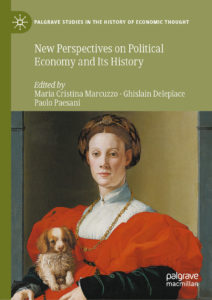M.C. Marcuzzo, G. Deleplace, P. Paesani (eds), “New Perspectives on Political Economy and Its History” (Palgrave 2020)
New Perspectives on Political Economy and Its History
Editors: Marcuzzo, Maria Cristina, Deleplace, Ghislain, Paesani, Paolo
ISBN 978-3-030-42925-6
Pp. XVIII-406
Book’s page in the Publisher’s website
This Festschrift is published in honour of Annalisa Rosselli, a political economist and historian of economic thought, whose academic activity has promoted unconventional ways of thinking throughout her career. A renowned list of scholars articulate and respond to this vision through a series of essays, leading to an advocacy of pluralism and critical thinking in political economy.
The book is split into five parts, opening with a section on new topics for the history of economic thought including new perspectives in gender studies and an illustration of the fecundity of the link with economic history. This is followed by sections that address relevant perspectives on the Classical approach to distribution and accumulation, Ricardo, interpretation of Sraffa and the legacy of Keynes.
This book will appeal to students interested in reforming economics, as well as academics and economists interested in political economy and the history of economic thought.
1 Introduction
Maria Cristina Marcuzzo, Ghislain Deleplace, and Paolo Paesani
Part I New Topics for the History of Economic Thought
2 The Methodological Role of the History of Economic Thought
Sheila Dow
3 A Bibliometric Portrait of Contemporary History of Economic Thought
Alberto Baccini
4 Moving Boundaries with Gender Budgeting: From the Margins to the Mainstream
Elisabeth Klatzer and Angela O’Hagan
5 Family, Gender Inequality and Growth: History Matters
Paola Villa
6 Money, Banking and Politics in Early Nineteenth-Century Portugal
José Luís Cardoso
Part II The Classical Perspective: Distribution of Income and Accumulation of Capital
7 Considerations on the Development of Quesnay’s Tableau Économique
Paolo Trabucchi
8 Classical Roots of the Criticisms of John Stuart Mill’s Wage-Fund Theory
Antonella Stirati
9 Classics Today: Smith, Ricardo, Marx
Christian Gehrke, Heinz D. Kurz, and Richard Sturn
Part III David Ricardo: Utilitarianism, Influence and Money
10 Bentham and Ricardo’s Rendez-vous Manqués
Christophe Depoortère, André Lapidus, and Nathalie Sigot
11 How Ricardo Came to Japan
Masashi Izumo, Yuji Sato, and Susumu Takenaga
12 From Ricardo to Sraffa: Gold as Monetary Standard in a Classical Theory of Money
Carlo Benetti and Jean Cartelier
Part IV Interpreting Sraffa
13 Dialogues Manqués Between Antonio Gramsci and Piero Sraffa on Ricardo, Classical Political Economy and ‘Pure Economics’
Jean-Pierre Potier
14 Real and Apparent Unknowns and the Origin of Sraffa’s Equations
Nerio Naldi
15 What Can Still Be Learnt from Sraffa’s Study of Prices in a Surplus Economy?
Richard Arena
Part V The Legacy of Keynes: Liquidity, Method and Laissez-faire
16 Keynes, Schumpeter, Mercantilism and Liquidity Preference: Some Reflections on How We Do History of Economic Thought
Richard van den Berg
17 The Original Meaning of ‘Liquidity Trap’ in the Early Discussions Between Robertson and Keynes
Luca Fantacci and Eleonora Sanfilippo
18 An Outline of a Keynesian-Sraffian Macroeconomics
Jan Kregel and Alessandro Roncaglia
19 The State and the Market in John Maynard Keynes and His Relevance Today
Mario Sebastiani
Index
